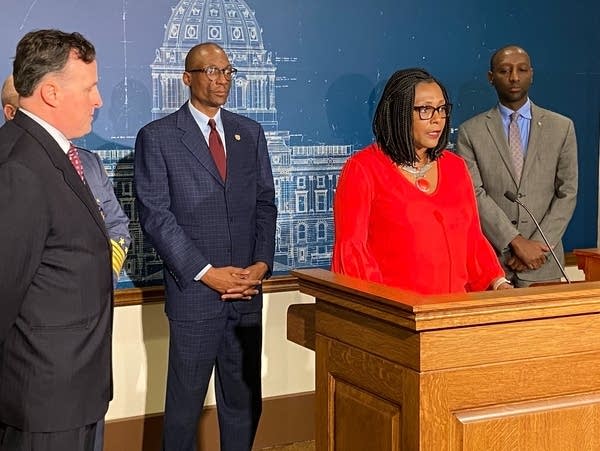Lawmakers hear recommendations to end structural racism in Minnesota

Go Deeper.
Create an account or log in to save stories.
Like this?
Thanks for liking this story! We have added it to a list of your favorite stories.
Exactly eight months after the killing of George Floyd, a new Minnesota legislative committee is urging lawmakers to consider a number of measures designed to close gaps across race in education, housing and public health and the criminal justice system.
A final report presented Monday by the House Select Committee on Racial Justice digs into Minnesota’s persistent racial disparities and underlying causes, which include policies and practices that have caused barriers for people of color and Indigenous communities.
The committee started its work September 2020 after the Legislature passed a resolution declaring racism a public health crisis.
Rep. Rena Moran, DFL-St. Paul, co-chair of the committee, said lawmakers have been discussing problems with racial disparities in Minnesota for years and introducing policies that may have served as Band-Aids instead of long-term solutions. But she urged representatives to examine various policies moving forward with a racial equity lens.
Turn Up Your Support
MPR News helps you turn down the noise and build shared understanding. Turn up your support for this public resource and keep trusted journalism accessible to all.
“There were laws and policies that were created by legislatures across the state, across this country, at the federal level and at the state level that created and facilitated an unequal playing field,” Moran said. “Tackling equity is not the frosting on top of the cupcake, but it is the butter in the batter.”
The report includes statistics on the wealth and income gap, redlining and disparities in state procurement for minority-owned businesses. It cites research that shows the state’s racial disparities have created a $287 billion wealth gap between white and BIPOC — Black, Indigenous and people of color — communities in Minnesota.
One of the impacts of long standing systemic racism, Moran said, is the wasting of human resources by ignoring the strengths of certain people because of their race. She also said it’s important to distinguish between internal racism and institutional racism.
“One of our final findings was that we are all adversely impacted by the system of racism,” she said, “and we all have a role to play in addressing that adverse impact.”
Moran introduced recommendations from the committee to the larger House Ways and Means Committee, which she also chairs. No votes were taken.
Recommendations include public safety reform in issues like cash bail, driver’s license fines and fees, decriminalization of marijuana and expungement of nonviolent marijuana convictions. They address health care disparities for women and children by recommending more access to health care insurance and providers.
It also suggests a state-paid family medical leave program. In the education realm, the report suggests mandatory teacher training in anti-racist practices.
Moran said the report should serve as guidance for committees as they discuss their priorities during fiscal year 2022-23 budget discussions.
Jamie Becker-Finn, DFL-Roseville, who served on the committee, said the goal is to internalize the information in the report and use it to guide policy discussions.
“If members bring a bill to my committee,” she said, “they should expect to address whether there is an impact disproportionately on different communities and what that impact is, or does this address an underlying disparity.”



